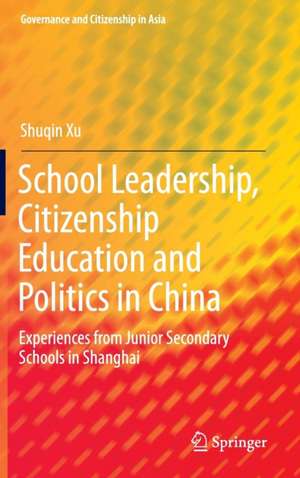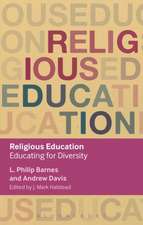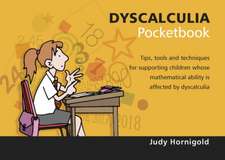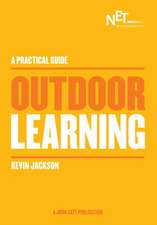School Leadership, Citizenship Education and Politics in China: Experiences from Junior Secondary Schools in Shanghai: Governance and Citizenship in Asia
Autor Shuqin Xuen Limba Engleză Hardback – sep 2016
| Toate formatele și edițiile | Preț | Express |
|---|---|---|
| Paperback (1) | 360.64 lei 39-44 zile | |
| Springer Nature Singapore – 15 iun 2018 | 360.64 lei 39-44 zile | |
| Hardback (1) | 374.05 lei 39-44 zile | |
| Springer Nature Singapore – sep 2016 | 374.05 lei 39-44 zile |
Preț: 374.05 lei
Nou
Puncte Express: 561
Preț estimativ în valută:
71.57€ • 74.58$ • 59.26£
71.57€ • 74.58$ • 59.26£
Carte tipărită la comandă
Livrare economică 31 martie-05 aprilie
Preluare comenzi: 021 569.72.76
Specificații
ISBN-13: 9789811016417
ISBN-10: 9811016410
Pagini: 212
Ilustrații: XVII, 195 p. 3 illus.
Dimensiuni: 155 x 235 x 14 mm
Greutate: 0.48 kg
Ediția:1st ed. 2016
Editura: Springer Nature Singapore
Colecția Springer
Seria Governance and Citizenship in Asia
Locul publicării:Singapore, Singapore
ISBN-10: 9811016410
Pagini: 212
Ilustrații: XVII, 195 p. 3 illus.
Dimensiuni: 155 x 235 x 14 mm
Greutate: 0.48 kg
Ediția:1st ed. 2016
Editura: Springer Nature Singapore
Colecția Springer
Seria Governance and Citizenship in Asia
Locul publicării:Singapore, Singapore
Cuprins
Chapter 1 Introduction.- Chapter 2 CE and School Leadership: Theoretical Perspectives.- Chapter 3 Social Change, School Leadership and CE in China: A Historical Review.- Chapter 4 A General Picture of School Leadership and CE in Shanghai.- Chapter 5 School Leaders' Perceptions and Responses to the CPC-Led State's Policies and Requirements: Four Major Scenarios.- Chapter 6 Complicated Working Relationship between Principals and SPSs: Coexistence of Cooperation and Contention.- Chapter 7 Factors shaping School Leadership in CE.- Chapter 8 Discussion and Conclusion: School Leadership in CE as a Political Exercise.
Notă biografică
Shuqin Xu graduated from Faculty of Education at the University of Hong Kong in 2013. Currently, she is a lecturer in Sun Yat-Sen University. Her main research areas include school leadership, citizenship education, education policy, education and social change in China.
Textul de pe ultima copertă
This book examines and theorizes the dynamics and complexities of leadership in citizenship education in junior secondary schools in Shanghai, China. Specifically, it examines from a macro- and micro-political theoretical perspective the interactions between principals and school party secretaries (SPSs), and how they respond to the demands of macro- and micro-political actors. This qualitative empirical research found four major school leadership/citizenship education scenarios in which principals and SPSs addressed the interests of different macro- and micro-political actors. Moreover, principals and SPSs enjoyed a complicated working relationship at the micro-political (school) level in which they collaborated to fulfill their responsibilities and respond to school macro- and micro-political actors, while competing for power over leadership in citizenship education. Principals’ and SPSs’ leadership in citizenship education was shaped by inter-related factors, including diverse influences in a multi-leveled world, the integration of politics and education, the demands of macro- and micro-political actors, and personal factors. To interpret these findings, this study proposes a theoretical framework for understanding leadership in citizenship education in China as a political exercise. This theoretical framework is useful for understanding the complexity of school and citizenship education leadership, the micro-political relationship between Chinese principals and SPSs, and their dynamic and complex interactions with macro- and micro-political actors.
Caracteristici
Clarifies the complex relationship between Chinese school leaders and the Chinese Communist Party-led state as regards leadership in citizenship education Proposes a theoretical framework for understanding school leadership in citizenship education in the Chinese context Reveals how school leadership in citizenship education is shaped by multi-believed contexts and the interplays between macro- and micro-political actors Includes supplementary material: sn.pub/extras
























